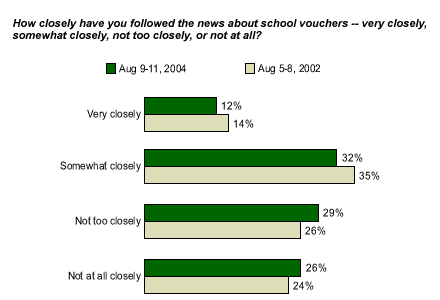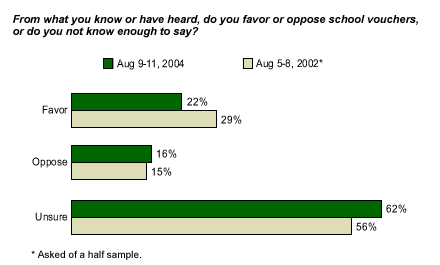School voucher proponents say vouchers are good because they expand educational opportunities for at-risk students. School voucher opponents say vouchers are bad because there is no evidence that vouchers lead to better student achievement. These are gross oversimplifications of the arguments for and against school vouchers, which give tax dollars to parents with children in public schools so they can send their children to better schools -- public or private. However, the he-said-she-said information available on vouchers may be compounding the complexity of an issue that already bewilders many Americans, if they are even thinking about it at all.
Gallup's annual survey on work and education issues* finds that less than half of Americans (44%) say they are following news about school vouchers at least somewhat closely, while a slim majority (55%) say they are not following the issue too closely (29%) or at all (26%). However, the poll also finds 6 in 10 Americans saying they don't know enough about vouchers to say whether they support or oppose them.
The 38% of Americans who do have an opinion on the voucher issue breaks down into 22% of Americans who say they favor vouchers and 16% who oppose them. Among those who are following the voucher issue closely, 42% favor them, 27% are opposed, and 31% have no opinion. Among the smaller group following the issue "very closely," 51% favor and 36% oppose vouchers.
In the past, when Gallup and other organizations have asked about vouchers and provided respondents with more information about what they are, Americans have been more likely to venture opinions. But analysis of a bevy of existing survey research indicates that there is neither consistent support nor opposition for school vouchers. The high percentage of respondents who say they are unsure about the issue (when given the option to say so), plus the varying opinion on vouchers depending on the way the issue is framed in survey questions, shows that opinions on vouchers are generally not firmly held.


"From a public opinion standpoint, it's not a top-of-mind issue," says Michael Pons, a policy analyst with the National Education Association (which opposes vouchers). "People don't see it as a viable way of addressing their concerns about education." Pons says school vouchers always come out at the bottom of the list when people talk about what they want for their own child: "They want better communication with teachers, competent teachers, and smaller classes so their child can get the right kind of attention."
Susan Mitchell, president of School Choice Wisconsin (which supports vouchers), isn't surprised that people seem unsure in their views about vouchers. "People aren't getting good information, and are getting a lot of misinformation," she says. "There's not much coverage of what happens in places like Milwaukee, which has the oldest and largest school voucher program. Few people understand the positive results we're seeing."
Public School Parents
One might assume that public school parents would be the most likely group to pay close attention to news about school vouchers. However, parents with children in public school aren't overwhelmingly more likely than people without school-age children to follow voucher news closely: 49% of public school parents are following the voucher issue closely, compared with 41% of those without school-age children. Half of public school parents have not been following it very closely or at all, compared with 58% of those without school-age children.
Consequently, similar percentages of public school parents and those without school-age children say they don't know enough about vouchers to say whether they favor or oppose them: 65% of public school parents don't know enough to offer an opinion, while 63% of those without school-age children don't know enough.
Race and Income
Minorities and Americans in lower income groups -- whose children are more likely to attend underperforming schools and would theoretically benefit most from vouchers -- aren't more likely to follow voucher news or know enough to have an opinion about them. Roughly 4 in 10 whites and nonwhites say they are following voucher news at least somewhat closely. About 60% of both groups don't know enough about the issue to say whether they support or oppose vouchers.
The more money people make, the more likely they are to say they're paying attention to the voucher issue. Only 35% of those making $30,000 or less annually are watching the issue at least somewhat closely, compared with 56% of those making $75,000 or more a year. However, research shows that those in higher income brackets tend to pay more attention to politics than do those in lower income brackets, so the attention being paid to the highly politicized voucher issue could partly explain these differences.
Pons finds it interesting that minorities and those in lower income brackets aren't more engaged with the issue. "This comes after a long and very expensive campaign on the part of pro-voucher advocates to try and reach out to low-income and minority parents," he says. "I think they see behind the hype -- that it's not really about helping poor kids, it's about expanding business opportunities. People who are trying to sell vouchers to low-income families are really swimming upstream."
Mitchell says that the voucher program in Milwaukee has been received very well among black families and Hispanic families, and she sees higher support overall in Wisconsin. "Low-income parents should have the options that most people take for granted because they can [afford to] move or pay," she says. In Mitchell's view, vouchers give low-income parents the power to leave, and in turn push public schools to improve so they can entice their students to stay.
*Results are based on telephone interviews with 1,017 national adults, aged 18 and older, conducted Aug. 9-11, 2004. For results based on the total sample of national adults, one can say with 95% confidence that the margin of sampling error is ±3 percentage points.
For results based on the subsample of 249 parents with a child or children in public school, one can say with 95% confidence that the margin of sampling error is ±7 percentage points.